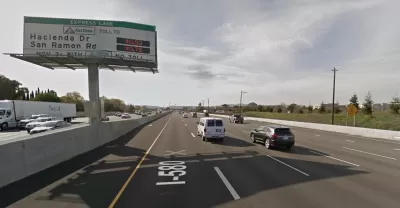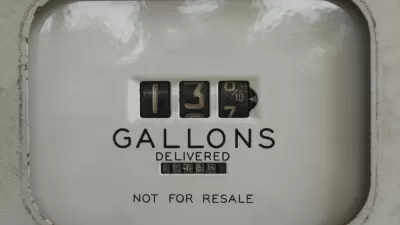State Sen. Scott Wiener authored legislation dubbed the Gas Tax Alternative Pilot to extend the California Road Charge Program that completed its pilot in 2017. The program takes on more significance with the 2035 sales ban of gas-powered vehicles.

[Updated June 14, 2021] Climate advocates suffered a major loss in Washington state last month after Gov. Jay Inslee, considered one of the greenest governors in the nation, vetoed a provision in a transportation electrification bill that set a goal of ending the sales of gas-powered cars by 2030 because of a requirement to first transition to a road usage charge, aka vehicle-miles-traveled fee.
California already has a ban on the sales of gas-powered passenger vehicles effective 2035 due to an executive order issued by Gov. Gavin Newsom last year. What it doesn't have is a road funding alternative to the gas tax. Legislation authored by Senator Scott Wiener (D-San Francisco) would enable the California State Transportation Agency to implement and evaluate an alternative road funding program similar to this in operation in Oregon and Utah.
Wiener wrote Senate Bill 339, the Gas Tax Alternative Pilot, to make transportation funding more sustainable and equitable. "With our transition to more fuel efficient vehicles — and ultimately away from carbon-fueled vehicles entirely — gas tax revenue will decline and eventually end," states his June 1 news release (source article).
“We need long-term, sustainable ways to fund transportation that don’t overburden low-income people who can’t afford electric vehicles,” said Senator Wiener. “Electric vehicles are an incredible innovation, but their wider adoption means that we need alternative ways to fund transportation that don’t rely
California Road Charge program
To a certain extent, SB 339 takes up where SB 1077: Road usage charge pilot program (2014), left off. The 9-month pilot program began in July 2016. A summary report was released in December 2017.
Caltrans continues work on the road usage charge through the California Four Phase Demonstration having won federal Surface Transportation System Funding Alternatives grants in 2016 and 2019 that were included in the nation's last federal transportation authorization legislation, the Fixing America's Surface Transportation (FAST) Act of 2015. [See 'related posts' grouped below.] The California Road Charge program ends on January 1, 2023.
SB 339
Unlike the original pilot that relied on "mock payments," which was written into the 2014 legislation (see "go-slow" approach in the related post), the new pilot will require that participants pay the mileage charge while they would be credited for the gas taxes paid, similar to the nation's longest-running road usage charge program, OReGO. The legislation extends the road charge program to January 1, 2027.
Senate Bill 339 is in the Assembly, having been approved by the Senate on June 1. Wiener expressed confidence during a phone interview with Planetizen that the bill would pass due to it having broad support.
It is sponsored by Transportation California and supported by the California Transportation Commission. Assemblymembers David Chiu (D-San Francisco) and Phil Ting (D-San Francisco) and Senators Bob Wieckowski (D-Fremont) and Josh Newman (D-Fullerton) are co-authoring the legislation.
The Mexican entertainment news media outlet, De Primera Mano Magazine reported on the bill after it was introduced on Feb. 8.
“California’s transportation network is critical for getting people to work and to school, and for ensuring our economic competitiveness” said California Transportation Commission (CTC) Executive Director Mitch Weiss. “We need to look to a road charge as an equitable, sustainable way to pay for transportation, that eventually will replace the gas tax. And we need to be prepared for this eventual transition and make sure we’ve studied it thoroughly for when the time comes.”
Washington state update
Coltura, the Seattle-based environmental group that organized support for the original Washington state legislation to ban the sale and registration of gas-powered vehicles beyond 2030, five years earlier than Gov. Gavin Newsom's executive order would take effect, is now advocating for a Newsom-styled executive order rather than state legislation as a means to achieve their goal of phasing out the consumption of gasoline.
"The point of Gov. Inslee's veto is that the transition to electric vehicles should not be interdependent on a yet-to-be-defined road usage charge," emailed communications director Samara Villasenor.
As CTC director Weiss noted above, the state needs to have an alternative revenue program to ensure stable road funding as the gas-powered passenger fleet transitions to electric vehicles. Washington state, like California, has a road usage charge program, having completed their initial pilot in January 2019, two years after the California pilot ended.
SB 5444, a bill to establish the state’s first road usage charge, which stalled during the 2021 Legislative Session.
“The bill really just focused on road usage charging being applied to electric vehicles by 2026 and it would be mandatory at that time,” said Reema Griffith, executive director of the Washington State Transportation Commission. “The bill currently remains in the Rules Committee on the Senate Floor and so we continue to do work on that.”
Related in Planetizen:
-
A Green Governor Vetoes Electric Vehicle Legislation, May 19, 2021
-
Gone by 2035: Gas-Powered Car Sales Have an Expiration Date in California, September 24, 2020
- Washington State to Decide on Transition From Gas Tax to Road Usage Charge, August 15, 2019
California Road Charge program:
-
California to Explore Next Steps in Converting From Gas Tax to Road Charge, December 14, 2017
-
Gas Tax Increases Have Their Limits, April 8, 2017
- Will California's Road Charge Fix California's Transportation Funding Shortfall? August 9, 2016
-
California Committee to Consider Road User Charge, January 26, 2015
- Mileage Fee Worries in the Golden State, December 9, 2014 [California's mileage fee pilot program legislation is now law]
- Mileage Fees Make Inroads in California and Michigan, May 20, 2014 [SB 1077 introduced]
FAST Act grants to fund gas tax alternative revenue pilot programs:
- Seven State DOTs Awarded $10 Million to Study Gas Tax Alternatives, February 25, 2019
-
Over $14 Million Awarded to Eight Projects to Find Alternatives to Gas Taxes, September 6, 2016
-
Federal Funding Authorized for States to Test Gas Tax Alternatives, January 10, 2016
FULL STORY: Senator Wiener’s Legislation To Extend Road Charge Pilot Program Passes Senate

Trump Administration Could Effectively End Housing Voucher Program
Federal officials are eyeing major cuts to the Section 8 program that helps millions of low-income households pay rent.

Planetizen Federal Action Tracker
A weekly monitor of how Trump’s orders and actions are impacting planners and planning in America.

Ken Jennings Launches Transit Web Series
The Jeopardy champ wants you to ride public transit.

Washington Legislature Passes Rent Increase Cap
A bill that caps rent increases at 7 percent plus inflation is headed to the governor’s desk.

From Planning to Action: How LA County Is Rethinking Climate Resilience
Chief Sustainability Officer Rita Kampalath outlines the County’s shift from planning to implementation in its climate resilience efforts, emphasizing cross-departmental coordination, updated recovery strategies, and the need for flexible funding.

New Mexico Aging Department Commits to Helping Seniors Age ‘In Place’ and ‘Autonomously’ in New Draft Plan
As New Mexico’s population of seniors continues to grow, the state’s aging department is proposing expanded initiatives to help seniors maintain their autonomy while also supporting family caregivers.
Urban Design for Planners 1: Software Tools
This six-course series explores essential urban design concepts using open source software and equips planners with the tools they need to participate fully in the urban design process.
Planning for Universal Design
Learn the tools for implementing Universal Design in planning regulations.
Heyer Gruel & Associates PA
Ada County Highway District
Institute for Housing and Urban Development Studies (IHS)
City of Grandview
Harvard GSD Executive Education
Toledo-Lucas County Plan Commissions
Salt Lake City
NYU Wagner Graduate School of Public Service




























